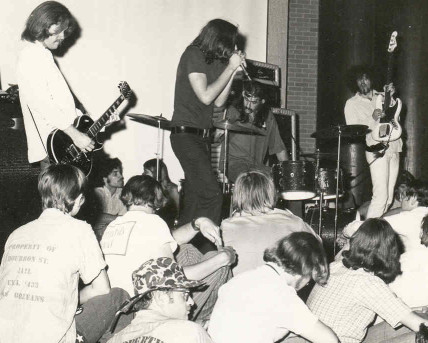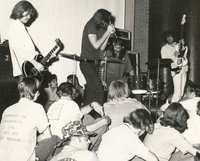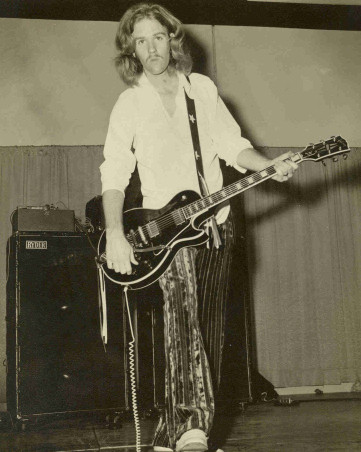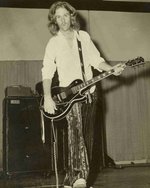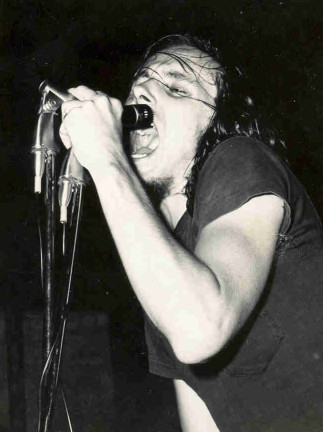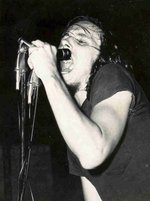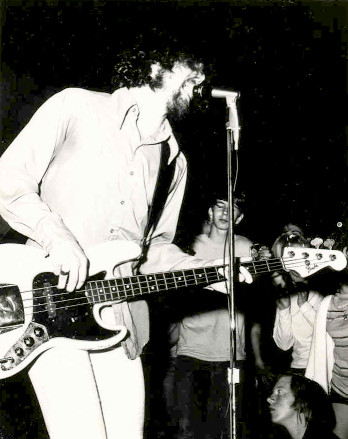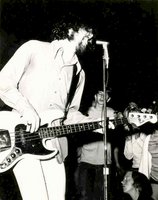December 2002 - JOSEFUS
It seems as if a few of the "lost" underground bands of the 60's/70's are reforming today, because Heavy Rock has become a bit more popular than ever before. People are showing interest in the roots of bands as Kyuss, Monster Magnet, Spiritual Beggars and so on. One of these legendary underground acts were the TX-based JOSEFUS. Founded in the late 60's, they've released three records in their short time of exsistence, and especially the "Dead Man" album is a hard and heavy hitter. Nearly as dark as the first album of the Sab's, it has become a cult-object for fans of old Heavy Rock and for a few Doomsters. In 2002, JOSEFUS have released an exciting new album, that's more a compilation of unreleased material, but the band is alive again. I've contacted guitarist Dave Mitchell for an interview with the Cosmic Lava webzine, and here's the entertaining result. All questions were compiled by 60's/70's specialist Rolf Kowalski and translated by me.
Hello, Dave! How are you and what are you doing in the moment?
I'm doing pretty well, thanks. I've been spending a lot of time lately in my studio.
Let's start with the history of JOSEFUS. When did you meet the other members and when have you founded the band? Have you played in other groups before JOSEFUS and have you recorded anything from this period?
Ray Turner brought me into the band to play lead guitar in 1969 while it was still called United Gas. He and I had played a lot together in high school with Phillip White, who became the other lead guitarist when we changed our name to Josefus. During school, we all played in different bands, but the three of us were always showing up at the same jam sessions. A lot of times we were at the 13th Floor Elevators' band house in southeast Houston. There were no close neighbors there. After graduation, Phillip and I formed a cover band and played the local clubs for about a year. But the only early recordings we have now are from a high school band that Ray and I were in called Rip West.
Whenever people talk about the band or a re-issue is released, it's mostly your second album "Dead Man", although I like the first album, too. What do you think is the reason for this circumstance and how would you compare both albums?
There has always been a lot of confusion about those albums. "Dead Man" on Hookah was our first release in 1970. But an earlier version had been recorded in December of 1969 with a slightly different track selection. That was eventually released in 1993 as "Get Off My Case" on Epilogue Records. Both of those were combined on one CD put out by Sundazed in 1999. The self-titled Mainstrean LP was actually our third and last recording. It came very near the end of the band, and was so weak when compared to "Dead Man" that many people assume it was our first effort. But the music from our Hookah album is what audiences heard at our shows and what fans remember us for.
Back in the late 60's/early 70's, which bands have influenced you, and with which bands have you shared the stage ? How much people came regular to your gigs, and is there a gig that you will never forget? How popular was the band in Texas in those days?
When I was first learning guitar, all I cared about was guitar licks. I played a lot with Ventures albums. As I began playing in bands, we did all the popular songs from the time, but The Yardbirds and their guitar sound was the biggest influence on my style. Josefus was the opening act for quite a few major concerts in Texas. We played with The Dead, Ten Years After, Procol Harum, Quicksilver Messenger Service, Pacific Gas & Electric, The Guess Who, and some I can't think of right now. We headlined our own shows in smaller cities and could draw a couple of thousand people. There are definitely gigs I remember, but for different reasons. It was usually some big name we played with, but other times it was some adventure surrounding the show - a fight or a brush with the law. A lot of crazy things happened to us.
How do you remember the years with JOSEFUS? Was there any kind of contact to other Texas-based bands, as the the ZZ Top forerunner bands Moving Sidewalks or American Blues for example? Was there any kind of "special" feeling in those days?
The Moving Sidewalks were a year or two before Josefus. But in 1968, Phillip and I split the bill at one club with the American Blues. When Josefus played with Grand Funk Railroad in 1969, ZZ Top was on the show, but it was only Billy Gibbons from the eventual line-up. A band called Bubble Puppy played that one, too, and they were probably better known than Josefus or ZZ Top at the time. This was all going on just after Woodstock, and everyone was talking peace and love. But more than anything we just felt like our generation had our own music.
How was the chemistry in the band ? Have you been friends or was there some trouble during the existence of JOSEFUS? Were drugs and alcohol important for you?
Our chemistry started out great, but it didn't last. Being in a band is like being married. You share a lot with each other when you're living on the road. And drugs definitely became a problem. I never wanted to be screwed up when I got on stage, but there were times when somebody was, and it usually hurt our performance. Drugs had a lot to do with why we broke up.
One of my faves of the "Dead Man" album is the cover-version of the Stones-classic "Gimmie Shelter". I like it more than the original, due to the heavy opening ,it's rougher and your guitar-work is great. Why have you chosen this song and have you played it also live?
Thanks for saying that. We wrote most all of our material, but to be able to play the longer shows we learned a few covers. Some of them worked for us and some didn't. "Louisiana Blues" became our show closer. With "Gimmie Shelter", we just had so much fun playing it live that we had to include it on the album.
Who got the idea for the impressive cover-artwork of the "Dead Man" album?
Ray's dad took the photo and designed the album for us. That was a real skull and I think Ray still has it. Mr. Turner was a big fan and really did a lot to help us. He'd set up his tape deck and record our live shows. Our newly released live recordings would never have existed except for him.
What was the reason for the length of the song "Dead Man" (17:30 min.). I ask for it, because some of your songs are between 2 and 4 minutes. Did you feel influenced from acts such as Grateful Dead during the recording of this song, because in some moments it sounds like a jam session in the studio. I really like it, when songs are expanding and become longer with a lot of guitars.
It's hard to remember just how it started, but that song was always long. When we wrote music as a band, Ray and I would usually start by jamming on some new idea. Then Pete would put lyrics to it. "Dead Man" had a slow building intro, long vocals, and a complete tempo change in the middle break, so it was pretty long. But after we played it live for a while, it got to be really long. I was using an Echoplex to get those added guitar sounds.
I received from Mark (Psychedelic Fanzine) the excellent "Dead Man aLive" CD, released on your old label Hookah Records. Please, tell us some background history of this CD and do you have more live-recordings of JOSEFUS? Is Hookah the band's own label?
Yeah. Hookah was our own label. Ray's dad came up with that, too. As for the new CD, we've had the idea for years. All these bootlegs and re-issues of our album kept coming out and we wondered what we might find in our old recordings that people would like to hear. We just never bothered to sit down with a tape deck and listen to all of it until last year. We spent months going through all those reels of tape, selecting and cleaning up the tracks that made the CD. But our next release will likely be all-new material. The rest of the old tapes were fun to listen to, but we wouldn't want to put any of it out.
I like the whole very informative CD booklet, that includes tasteful photos of the band and the live-gigs and that the songs are split into three periods of the band's existence. From the "Early Recordings" I really like "I Love You" and the very long version of "Dead Man" (26:01 min.) leaves me still speechless. But what was totally new for me, is the fact that you had a short reunion from '78 - '79. What is the story behind the reunion and why did it only last so short?
Pete, Ray and I were always getting back together and trying some things. It seems every couple of years we had a series of rehearsals trying to revive our old magic, but 1978 was when we really got serious about it. We had Jerry Ontiberoz on drums, who had played with them in the band StoneAxe in 1971. We did a few shows in Houston and five tracks in the studio, but disco was everywhere then, and we just got too discouraged to go on.
I've also got two obscure singles of JOSEFUS, which aren't included on the CD. Did you release other singles in the old days and can we expect another CD on Hookah with more material?
Those singles came from the 1978-79 reunion you just mentioned. The fifth studio track we'd done was Wheels, which is on the new CD. A couple of other singles are out there from our early days. The Dandelion 45 has two cuts from our first studio session in 1969 but under the name Come. That's what our first producer wanted us to call the band. We also had a promotional 45 from our Mainstream album, but that was made with our name misspelled as Josephus. As for another CD, there really isn't much more of the old stuff that we could use, but we're talking about going back into the studio in 2003 to record an all-new CD. Pete has never stopped writing songs and something seems to happen whenever we get together to play.
The third single was an EP with two other bands on the "Home Cooking" label. You' ve been featured with two instrumental tracks, but under the name The Guitar Orchestra. Were any other members of JOSEFUS involved or was it just a studio project of yourself, where you tried something out, new ideas and so on?
The Guitar Orchestra was my solo project - rock guitar influenced by me listening to a lot of classical music. I was driving a delivery van for ten hours a day and got totally burned out on rock radio at the time. I started listening to the fine arts station and it was like I was hearing violins playing guitar licks. Not really, but that led me to try new combinations of multiple guitar parts. I wrote out an entire instrumental album, but those two EP tracks were the only recordings that I finished. I had turned one of my bedrooms into a small studio, and that whole EP was pretty much recorded there on a 4-track. That's why we called it Home Cooking. We were trying to develop a musicians co-op and do our own productions. It was an early rebel movement against the industry establishment. We put on a few local shows and one of those was what brought Josefus back together in 1978.
Dave, what are your future plans with the band or for yourself?
I'm finally about to finish recording my Guitar Orchestra composition. Right now I'm on a break from that to record some arrangements of Christmas music. Links are on the Josefus web site. I'm hoping to encourage a little seasonal sharing. And Josefus still has at least one CD left in us. We just have to find a way to get our schedules together. We've even talked about possibly touring in 2003 when the weather gets nice again.
Thanks a lot for your time!!! All the best for you and best greetings from the Cosmic Lava crew to you and the other guys of JOSEFUS. Is there something you like to add at last?
We really want to thank everyone at Cosmic Lava for all their support. It is quite a compliment to old-timers like us that our music has survived all these years and that someone still enjoys listening to it. People can contact us at www.josefusmusic.com All the new things we are working on will be posted there.
